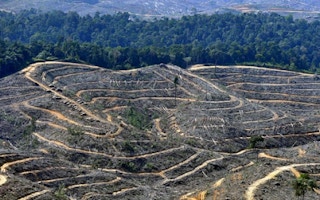Environmental groups accused Indonesia’s second-largest pulp and paper company Asia Pacific Resources International Ltd. (April) of using a $17 million peatland restoration project in Riau’s heavily degraded Kampar Peninsula to “greenwash” the continued cutting of old-growth forests on Tuesday.
The pulp company, a subsidiary of the Singapore-listed agribusiness RGE, partnered with Fauna & Flora International (FFI) to restore more than 20,000 hectares of damaged peatland in the Kampar Peninsula. The peninsula, once home to rich tropical forests, has been heavily depleted of natural tree cover by pulp and palm oil companies.
The project, dubbed Riau Ecosystem Restoration (RER), will create a conservation area where work can be done to restore the region’s peatland while cataloging and preserving the existing flora and fauna, the company said.
“We are pleased that the project is coming into clear focus,” said Bey Soo Khiang, head of April and founder of RER. “From this point forward, we anticipate steady progress toward our goal of reviving the land and protecting it for future generations.”
This recent push for peatland restoration caught the attention of the Pekanbaru-based Forest Rescue Network Riau (Jikalahari), a watchdog group focused on deforestation and land issues in the once-forest rich province. Jikalahari accused April of greenwashing efforts to continue the clearing of old-growth forest in Riau by subsidiary Riau Andalan Pulp and Paper (RAPP), including the cutting of forests in a disputed concession on the peat-heavy Padang Island.
“What we see is that this is no more than greenwashing as they are still cutting trees elsewhere, such as Pulau Padang,” Jikalahari coordinator Muslim Rasyid said. “We know RAPP’s track record of wood exploitation. Suddenly they’re [now] changing the direction of their business to restoration?”
More than half the wood processed by RAPP’s massive pulp mill in Riau has historically come from existing tropical forests, according to estimates by numerous environmental and forestry groups. According to Greenpeace, the company announced plans to convert an additional 60,000 hectares of existing forest into pulp and paper last year.
Jikalahari questioned the Ministry of Forestry’s quick response to April’s application to restore the peatlands. Several similar projects proposed by other organizations were declined or remained in limbo, Muslim said.
“[We] question the ministry’s fast response to RAPP’s application for the restoration project when applications from many other companies have been abandoned,” he said. “I’m sure [RAPP] will have two or three other [restoration] projects after this.”
Indonesia’s Forestry Ministry, the body tasked with both protecting and developing the nation’s shrinking rainforests, awarded the project a 60-year license in May.
“This ecosystem license granted by the ministry is significant as it is the first to be granted to an organization with a collaborative structure involving the private sector and civil society groups,” Forestry Minister Zulkifli Hasan said in the company’s press release. “I see this collaborative model working for a common purpose as an innovative boost to the government’s efforts to ensure a balance in responsible forest industry development with conservation of important forest areas.”
The project’s website championed April as a “pioneer in implementing sustainability practices in the pulp and paper industry in Indonesia.” The description is a stark departure from environmental groups’ assessments, which once called the company one of “Indonesia’s, and perhaps the world’s, most destructive corporations.”
While pulp and paper giant Asia Pulp and Paper (APP) recently made a commitment to sustainable pulping practices, April has gone the other way, opting for less external oversight in its operations. The company pulled out of the Forest Stewardship Council in June, ending a period of oversight by the coalition of environmental organizations. April said it ended the relationship over concerns with the council’s certification program, but environmental groups suspected other motives.
“Before an NGO-initiated FSC complaint process even had an opportunity to begin to investigate April’s deforestation practices, the company had effectively walked out on the FSC’s certification scheme,” Bustar Maitar, head of Indonesia Forest Campaign for Greenpeace Southeast Asia, wrote in a scathing blog post shortly after the announcement. “Seemingly, April did not want to risk the scrutiny of FSC’s Policy for Association complaints process.”
The latest allegations of greenwashing came on the heels of a highly publicized dispute between the forest minister and celebrity activist Harrison Ford. The Hollywood star came under fire after Zulkifli accused Ford of “attacking” with questions about the ministry’s patchy track record with curbing illegal logging.
Ford, who was in Indonesia making a Showtime documentary on climate change called “Years of Living Dangerously,” was then threatened in the press with deportation despite pre-existing plans to leave the country.
“There’s no privilege for him although he is a great a actor,” presidential adviser Andi Arief told Agence France-Presse. “His crew and those who were helping him in Indonesia must be questioned to find out their motives for harassing a state institution.
“If necessary, we will deport him.”
Indonesia’s rain forests have disappeared at an alarming rate as agribusiness companies ramped up operations to meet the demands of China’s commodity boom. More than 4 million hectares of forested land have vanished in Riau since 1982 as the province booked the fastest rate of deforestation in the world, according to the World Wildlife Fund.
The cutting of the nation’s rain forests will likely continue despite international condemnation. The Forestry Ministry announced plans last year to significantly expand the nation’s pulp capacity in the next decade. The expansion would include the construction of seven new pulp mills and the awarding of concessions in previously untouched forests in eastern Indonesia, according to the Center for International Forestry Research (CIFOR).

















